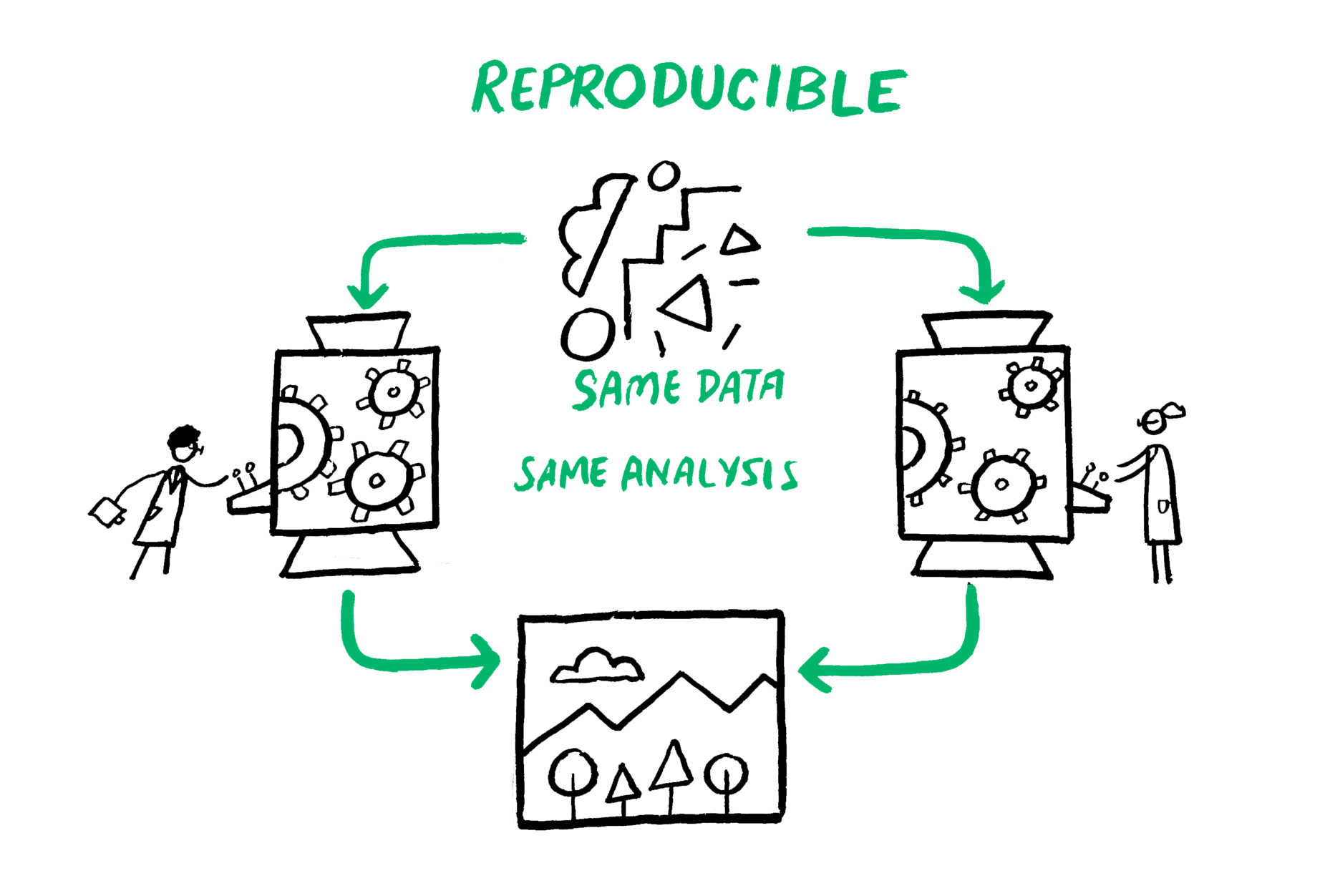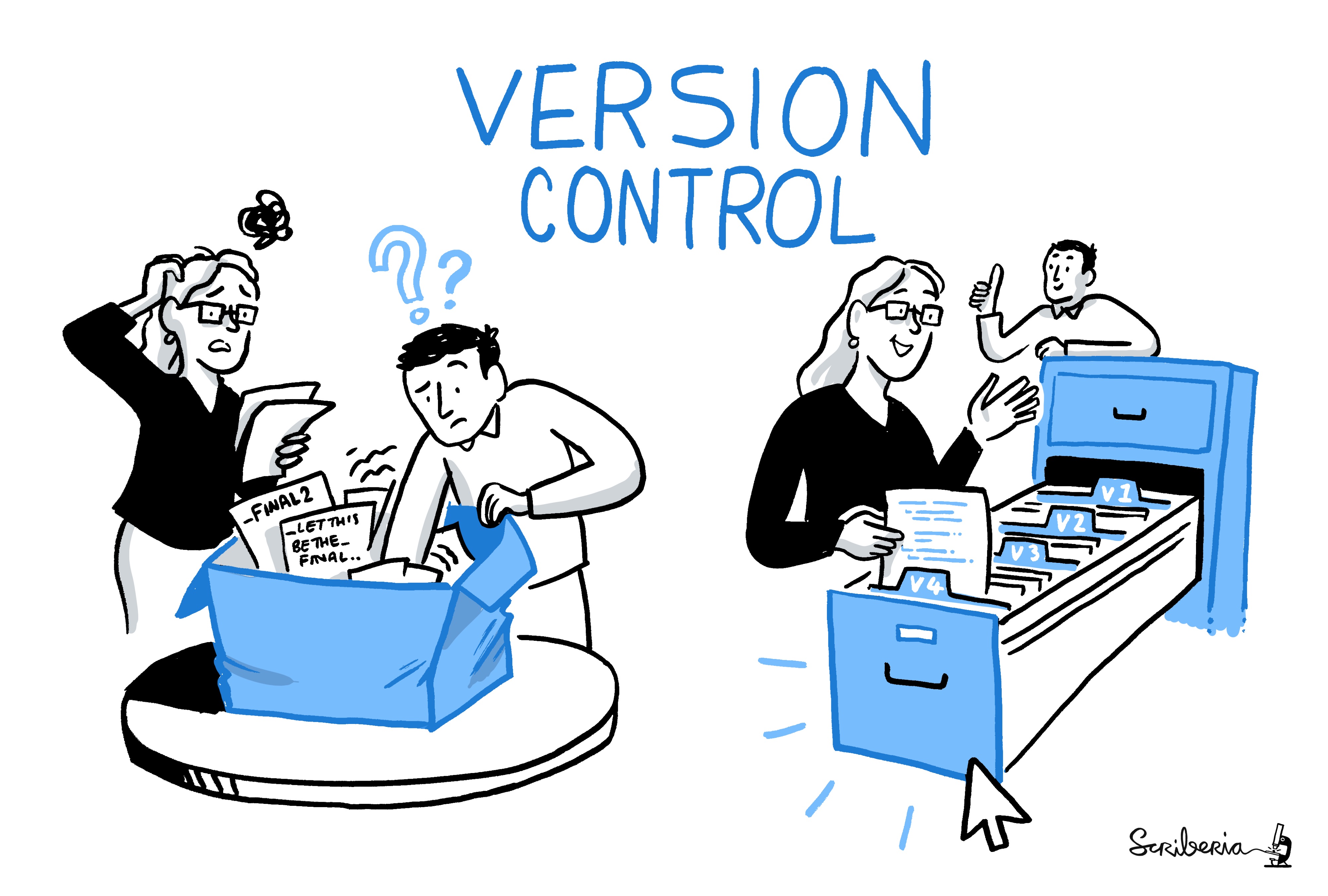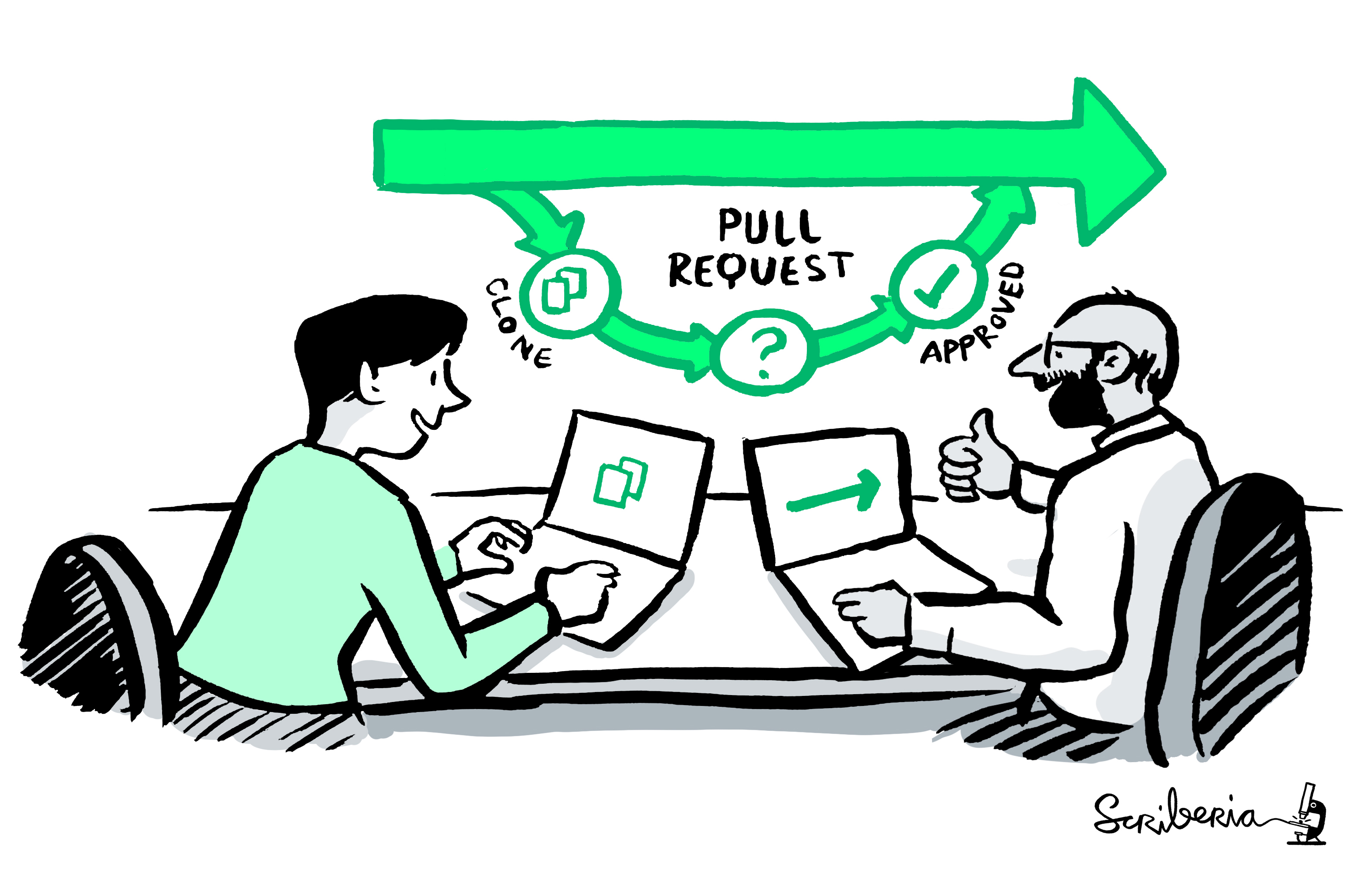| No | Date | Title | Contents | Reading | Survey/Quiz |
|---|---|---|---|---|---|
| 1 | 2024-04-08 | Introduction to version control | Organisational matters Overview of seminar sessions Introduction to version control Introduction to Git and its advantages |
Intro to version control | Course introduction Survey |
| 2 | 2024-04-15 | Command line | File Systems Benefits of the Command Line Basic Command Line commands |
Command Line | Command Line Quiz |
| 3 | 2024-04-22 | Setup + Git Fundamentals | Installation and configuration of Git Initializing a Git repository Basic Git commands |
Installation, Setup, First steps with Git | Installation Survey, Git Basics Quiz |
| 4 | 2024-04-29 | Basic Git workflow | Practicing basic Git commands Ignoring files with .gitignore Good commit messages |
First steps with Git | Git Basics Quiz |
| 5 | 2024-05-06 | Git Branching and Merging | Understanding branches in Git Creating and switching between branches Merging branches Resolving merge conflicts |
Branches | Git Branches Quiz |
| 6 | 2024-05-13 | Quarto Workshop | Introduction to Quarto | ||
| 7 | 2024-05-20 | Whit Monday | Cancelled | ||
| 8 | 2024-05-27 | Introduction to GitHub | Introduction to remote repositories Creating a GitHub account Creating and managing repositories on GitHub Pushing and pulling changes |
GitHub Intro | GitHub Quiz |
| 9 | 2024-06-03 | GitHub with collaborators | Cloning a remote repository Branching and merging in a collaborative environment Pull Requests GitHub Issues Graphical User Interfaces (GUIs), e.g., GitKraken |
GitHub Intro, GitHub Issues | GitHub Quiz |
| 10 | 2024-06-10 | GitHub with the world | Forking a remote repository README files Project Management |
GitHub Intro, GitHub Issues | GitHub Quiz |
| 11 | 2024-06-17 | Repetition and Practice | Repetition and Practice | ||
| 12 | 2024-06-24 | Publishing | Creating Tags with Git Creating Releases with GitHub Using Zenodo for scientific publishing Licences Citation Files |
Tags and Releases | |
| 13 | 2024-07-01 | Graphical User Interfaces (cancelled) | Repetition and Practice Introduction to using GUIs |
Graphical User Interfaces | |
| 14 | 2024-07-08 | Summary & Wrap-Up | Course evaluation Repetition and Practice Introduction to using GUIs |
Graphical User Interfaces |
Session 1: Introduction
Track, organize and share your work: An introduction to Git for psychological research
Course at University of Hamburg
April 08 2024 (12:15 pm)
1 Logistics and admin
Team
Research on “Mechanisms of Learning & Change”
How does the brain use past experience to guide future decisions?

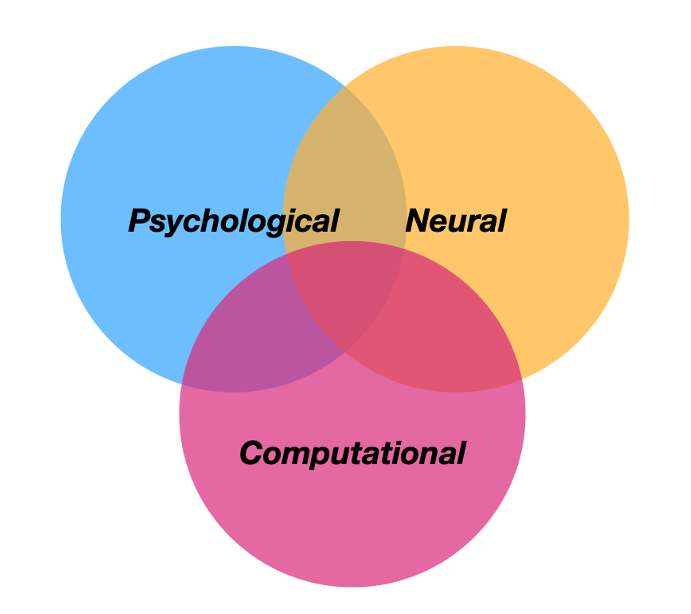
Find out more on our group’s website: https://schucklab.gitlab.io/
Research / teaching assistant positions + thesis projects
Version Control Course
- 📓 Tasks: Support our teaching project!
- 📆 Duration: flexible
- 🕐 Time: flexible
- 💰 Salary: 12.00 € / hour (SHK) / 13.95 € / hour (WHK)
- ✉️ Contact: lennart.wittkuhn@uni-hamburg.de


Research projects in our group
- 📓 Tasks: data collection & analysis (e.g., fMRI)
- 📆 Duration: felxible
- 🕐 Time: flexible
- 💰 Salary: 12.00 € / hour (SHK) / 13.95 € / hour (WHK)
- ✉️ Contact: sekretariat-luv.psych@uni-hamburg.de
Who are you?
- Your name?
- Your preferred pronouns?
- One (fun) fact about you? For example:
- What did you study before and where?
- What do you expect from this course?
- What’s your hobby?
- Do you have a pet?
- What’s your favorite color?
- Your mood on rubber duck scale?

Course overview
- Date: Summer semester 2024 (April to July)
- Time: Mondays, 12:15 - 13:45 (90 Minutes)
- Room: Von-Melle-Park 5, Room 3016
- Instructor: Dr. Lennart Wittkuhn
- Assistant: Konrad Pagenstedt
- Event: Seminar
- Credits: 4,0 (2 SWS)
- Language: English
- Tag: PsyM14-PsyWB-K04
What will the average seminar session look like?
The course will consist of up to 13 sessions (90 minutes each)
- Content Review (up to 30 minutes):
Course participants engage with the online materials (aka. our “Version Control Book”), supplemented by short presentations by the instructors. Some course preparation may occur outside of the class.
- Interactive Discussions & Quizzes (up to 15 minutes):
Course participants collectively address any inquiries related to the session’s content and online materials. Instructor-led quiz questions may also be interspersed throughout.
- Exercises & Implementation (up to 60 minutes):
Course participants actively delve into hands-on exercises and assignments.
Logistics
- You need a laptop. Talk to us if you don’t have a laptop.
Note, that course participants are sometimes required to work on course materials outside of class time.
Not all course contents will be covered during class time.
Schedule
Course Website
Version Control Book
Exercises, quizzes & surveys
- We use online surveys to ask you questions and implement exercises or quizzes
- Implemented in the formr survey framework (open-source, hosted in Germany)
Anonymity & data usage
- all raw data are kept anonymous and will only be used for research and educational purposes
- if responses are shared as part of the course, they will be aggregated to ensure anonymity is maintained
- if you want your data to be deleted, send an email with your personal codeword to sekretariat-luv.psych@uni-hamburg.de (Christine Manor). Our secretary forwards your codeword to us (without your name).
Your role: questions and communication
Questions & discussions during class time
- Ask questions! There are no stupid questions!
- Participate in the discussions
- Ask questions! There are no stupid questions!
Questions & discussions outside of class time
- Ask questions! There are no stupid questions!
- Send questions to our mailing list: version-control-course-ss24.psych@lists.uni-hamburg.de
- Send questions to Lennart and / or Konrad
- Office hours by appointment via email
- Be proactive: Give us feedback!
Your role: active participation
Active participation
- This is a pass / fail course. You pass if you fulfill all course requirements:
- Requirement 1: Come to at least 11 out of 13 sessions (85%)
- Requirement 2: Complete all surveys/quizzes
- Requirement 3: Complete all mandatory exercises (implemented in Git)
How do we verify the course requirements?
- Requirement 1: Sign the attendance list
- Requirement 2: Provide a personal codeword. At the end of the semester, send an email with your personal codeword to sekretariat-luv.psych@uni-hamburg.de (Christine Manor). We will send our secretary a list of personal codewords and she will return a list of names.
- Requirement 3: At the end of the semester, send a link to your completed exercises.
Course exercise: Building an online recipes book
Example: https://lennartwittkuhn.com/recipes
Code of Conduct
During this course, we want to ensure a safe, productive, and welcoming environment for everyone who attends. All participants and speakers are expected to abide by this code of conduct. We do not tolerate any form of discrimination or harassment in any form or by any means. If you experience harassment or hear of any incidents of unacceptable behavior, please reach out to the course instructor, Lennart Wittkuhn (lennart.wittkuhn@uni-hamburg.de), so that we can take the appropriate action.
Unacceptable behavior is defined as:
- Harassment, intimidation, or discrimination in any form, verbal abuse of any attendee, speaker, or other person. Examples include, but are not limited to, verbal comments related to gender, sexual orientation, disability, physical appearance, body size, race, religion, national origin, inappropriate use of nudity and/or sexual images in public spaces or in presentations, or threatening or stalking.
- Disruption of presentations throughout the course. We ask all participants to comply to the instructions of the speaker with regard to dedicated discussion space and time.
- Participants should not take pictures of any activity in the course room without asking all involved participants for consent and receiving this consent.
A first violation of this code of conduct will result in a warning, and subsequent violations by the same person can result in the immediate removal from the course without further warning. The organizers also reserve the right to prohibit attendance of excluded participants from similar future workshops, courses or meetings they organize.
2 Survey results
Expectations
No idea (for example: “i really have no idea about that”)
Data analysis (for example: “How to work with research data”)
Git/GitHub (for example: “Practical tasks with git and github, theoretical background”)
Hopes
Data analysis skills (for example: “Learning practical information about data analyses”)
Coding skills (for example: “Hopes for better coding skills post-course”)
Science Communication (for example: “Science communication and networking using research”)
Version Control Skills (for example: “Getting an idea of what is possible with GitHub”)
Worries
Lack of coding skills (for example: “My low ability in coding”)
Inadequate previous knowledge (for example: “I worry that I don’t have enough previous knowledge”)
Language barrier
Learning pace
Motivation
Pragmatic course selection (for example: “I needed a course for ‘Wahlbereich’ and this one was the only available one.”)
Learning new skills (for example: “For me it is very important to get to know tools and learn how to handle them.”)
Version Control
Can you briefly define the term version control?
No idea (for example: “I don’t know what that is”)
“(…) it’s about comparing the latest version of someone else who is working on the same project as me with my version”
Scenarios
Imagine a scenario where you crafted a brilliant paragraph for your document (for example, your paper, thesis or report), but then accidentally ruined it. How would you retrieve the earlier brilliant version? Is it even possible?
- “In the past, I mostly worked with doc documents (word) and saved every day a new version when I was the only person working on the document. This was not very practical and I hope to learn an alternative during this course”
(…) Consider a situation where you are working with five co-authors on a paper. How do you handle the changes and comments they make to the document
- “I know that you can accept changes and comments in word, but I always find it confusing and complex to keep the overview. I don’t know what happens to the history of modifications.”
3 Introduction to version control
Learning objectives
At the end of this session, you should be able to answer the following questions:
💡 You know what version control is.
💡 You can argue why version control is useful (for research).
💡 You can name benefits of Git compared to other approaches to version control.
💡 You can explain the difference between Git and GitHub.
Your turn
- Read Chapter 1: “Introduction to Version Control” in the Version Control Book
- Discuss the learning objectives with your desk neighbor (quietly)
Learning objectives
💡 You know what version control is.
💡 You can argue why version control is useful (for research).
💡 You can name benefits of Git compared to other approaches to version control.
💡 You can explain the difference between Git and GitHub.
The issue of computational reproducibility in science
The problem
Why?
“… accumulated evidence indicates […] substantial room for improvement with regard to research practices to maximize the efficiency of the research community’s use of the public’s financial investment.” (Munafò et al., 2017)
We need a professional toolkit for digital research!
Why we need version control …
… for code (text files) 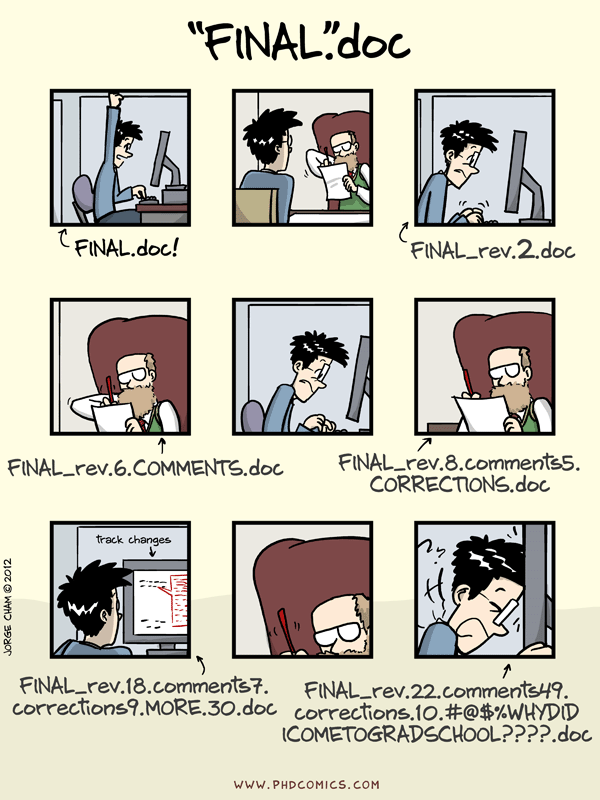
… for data (binary files) 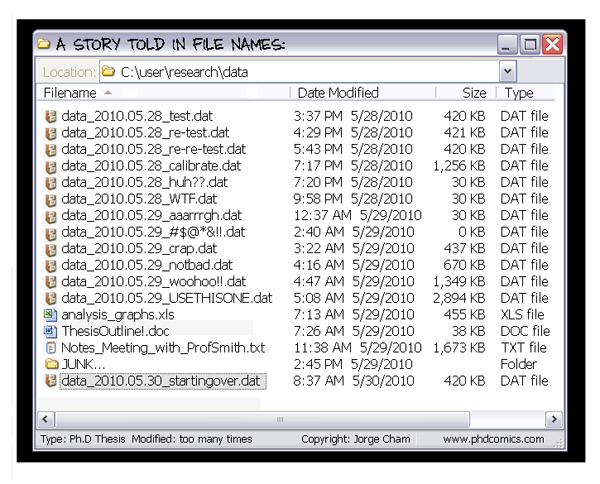
When everything is relevant …
… track everything.
What is version control?
“Version control is a systematic approach to record changes made in a […] set of files, over time. This allows you and your collaborators to track the history, see what changed, and recall specific versions later […]” (Turing Way)
keep track of changes in a directory (a “repository”)
take snapshots (“commits”) of your repo at any time
know the history: what was changed when by whom
compare commits and go back to any previous state
work on parallel “branches” & flexibly “merge” them
“push” your repo to a “remote” location & share it
share repos on platforms like GitHub or GitLab
work together on the same files at the same time
others can read, copy, edit and suggest changes
make your repo public and openly share your work
What is Git?
- most popular version control system
- free, open-source command-line tool
- graphical user interfaces exist, e.g., GitKraken
- standard tool for most (all?) software developers
- 100 million GitHub users 6
Schedule
| No | Date | Title | Contents | Reading | Survey/Quiz |
|---|---|---|---|---|---|
| 1 | 2024-04-08 | Introduction to version control | Organisational matters Overview of seminar sessions Introduction to version control Introduction to Git and its advantages |
Intro to version control | Course introduction Survey |
| 2 | 2024-04-15 | Command line | File Systems Benefits of the Command Line Basic Command Line commands |
Command Line | Command Line Quiz |
| 3 | 2024-04-22 | Setup + Git Fundamentals | Installation and configuration of Git Initializing a Git repository Basic Git commands |
Installation, Setup, First steps with Git | Installation Survey, Git Basics Quiz |
| 4 | 2024-04-29 | Basic Git workflow | Practicing basic Git commands Ignoring files with .gitignore Good commit messages |
First steps with Git | Git Basics Quiz |
| 5 | 2024-05-06 | Git Branching and Merging | Understanding branches in Git Creating and switching between branches Merging branches Resolving merge conflicts |
Branches | Git Branches Quiz |
| 6 | 2024-05-13 | Quarto Workshop | Introduction to Quarto | ||
| 7 | 2024-05-20 | Whit Monday | Cancelled | ||
| 8 | 2024-05-27 | Introduction to GitHub | Introduction to remote repositories Creating a GitHub account Creating and managing repositories on GitHub Pushing and pulling changes |
GitHub Intro | GitHub Quiz |
| 9 | 2024-06-03 | GitHub with collaborators | Cloning a remote repository Branching and merging in a collaborative environment Pull Requests GitHub Issues Graphical User Interfaces (GUIs), e.g., GitKraken |
GitHub Intro, GitHub Issues | GitHub Quiz |
| 10 | 2024-06-10 | GitHub with the world | Forking a remote repository README files Project Management |
GitHub Intro, GitHub Issues | GitHub Quiz |
| 11 | 2024-06-17 | Repetition and Practice | Repetition and Practice | ||
| 12 | 2024-06-24 | Publishing | Creating Tags with Git Creating Releases with GitHub Using Zenodo for scientific publishing Licences Citation Files |
Tags and Releases | |
| 13 | 2024-07-01 | Graphical User Interfaces (cancelled) | Repetition and Practice Introduction to using GUIs |
Graphical User Interfaces | |
| 14 | 2024-07-08 | Summary & Wrap-Up | Course evaluation Repetition and Practice Introduction to using GUIs |
Graphical User Interfaces |
Next week: The command line
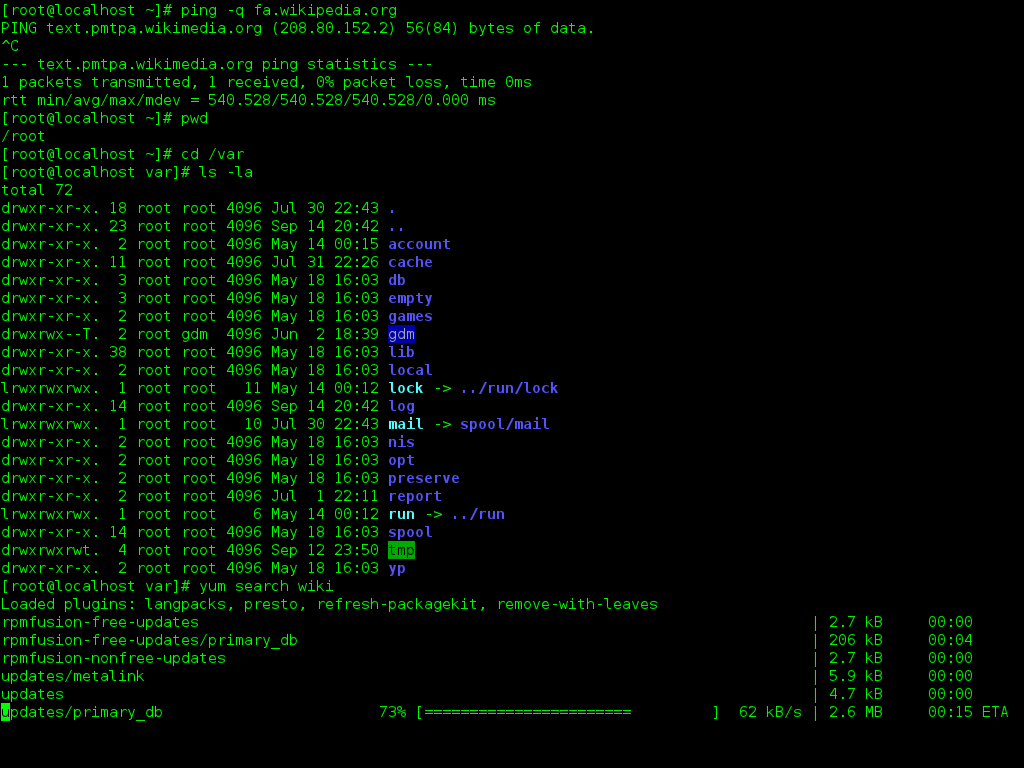
Source: Wikimedia Commons (free license)
Homework
1. Check if you have Git / a command line installed
Windows Users
- Download and install Git for Windows until next week
- You can find a tutorial in the Version Control Book
Apple or Linux Users
- Download and install Git until 15.04. (in two weeks)
- You can find a tutorial in our Version Control Book
2. Complete the pre-course survey
Research Colloquium: Cognitive Neuroscience
| Date | Time | Topic | Presenter | Room |
|---|---|---|---|---|
| 03 Apr | 17:00 | Hippocampal Remapping and Reward coding in mice | Mari Sosa (Stanford) | Zoom |
| 10 Apr | 10:15 | Meta Learning of Learning Rates | Jonas Simoens (U Ghent) | VMP 5 4018 |
| 17 Apr | 10:15 | Decision Making Strategies in younger and older adults | Alexa Ruel (UHH) | VMP 5 4018 |
| 24 Apr | 15:15 | Replay shapes abstract cognitive maps for efficient social navigation | Jae-Young Son (Brown) | VMP 5 4054 |
| 08 May | 16:00 | TBD | Bob Wilson (U Arizona) | VMP 5 4018 |
| 15 May | 10:15 | TBD | Tobias Donner (UKE Hamburg) | VMP 5 4054 |
| 29 May | 14:00 | TBD | Ben Eppinger (U Greifswald) | VMP 5 4054 |
| 05 Jun | 10:15 | Memory replay in younger and older adults | Xiangjuan Ren (UHH) | VMP 5 4018 |
| 12 Jun | 10:15 | Generalisation through replay | Fabian Renz (UHH) | VMP 5 4018 |
| 19 Jun | TBD | VMP 5 4018 | ||
| 26 Jun | TBD | VMP 5 4018 |
Research / teaching assistant positions + thesis projects
Version Control Course
- 📓 Tasks: Support our teaching project!
- 📆 Duration: flexible
- 🕐 Time: flexible
- 💰 Salary: 12.00 € / hour (SHK) / 13.95 € / hour (WHK)
- ✉️ Contact: lennart.wittkuhn@uni-hamburg.de


Research projects in our group
- 📓 Tasks: data collection & analysis (e.g., fMRI)
- 📆 Duration: felxible
- 🕐 Time: flexible
- 💰 Salary: 12.00 € / hour (SHK) / 13.95 € / hour (WHK)
- ✉️ Contact: sekretariat-luv.psych@uni-hamburg.de
References
Version Control Course
Footnotes
The Turing Way Community (2022), see “Guide on Reproducible Research”
for example, in Psychology: Crüwell et al. (2023); Hardwicke et al. (2021); Obels et al. (2020); Wicherts et al. (2006)
see Baker (2016), Nature
see e.g., Poldrack (2019)
see Smaldino & McElreath (2016)
(Source: Wikipedia)
pull requests on GitHub, merge requests on GitLab




